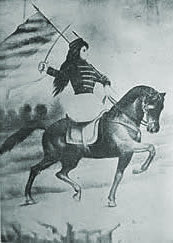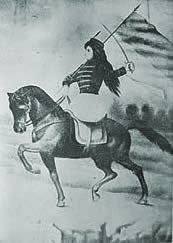
|
Women and Independence in Latin America An exploration of women's involvement in the Latin American Wars of Independence |

|

|
Women and Independence in Latin America An exploration of women's involvement in the Latin American Wars of Independence |

|
Other names: La Heroína del Bracho
Gender:Female
Ethnic origen: White
Events:
| 1821 | - | Santiago del Estero | - | Not applicable | - | She was born in Santiago de Estero. |
| 1838 | - | Santiago del Estero | - | Unknown | - | She married José María Libarona. |
| 1840 | - | Buenos Aires | - | Unknown | - | She fled for Buenos Aires after a rebellion. |
| 1842 | - | Tucumán | - | Unknown | - | She moved here around 1842. |
| 1843 | - | Buenos Aires | - | Unknown | - | Her husband died. |
| 1850 | - | Salta | - | Unknown | - | She lived in Salta in the 1850s. |
Connections:
Female relatives of past and future leading political/military/ cultural figuresBiography:
Born in Santiago de Estero on 1 February 1821, her parents were María Antonia Gastañaduy, daughter of the last governor of Santa Fe, and Santiago Palacio. She married José María Libarona in 1838. They fled for Buenos Aires in 1840 after a rebellion, Libarona was betrayed by a guide and imprisoned. He went mad in prison and could no longer recognise Palacio. She and their two daughters were left to fend for themselves, she built a shelter and marked out a plot on which she grew maize and pumpkins. Libarona died in 1843, Palacio buried him in the forest and returned to Santiago del Estero, her family barely recognised her. She died in 1863. (Sosa de Newton, 470)
In 1856 French scientist Martin de Moussy and his companion, Benjamin Poucel, surveyed Argentina and its people. They heard of "La Heroína del Bracho" and met her in July 1856. Poucel described her as an angelical being. Her story had been told and re-told since the 1850s. She had kept a diary that an Italian traveller, Paolo Mantegazza, quoted around 1866. Mary Berg claims that Palacio's story is a "timeless testimonio". In September 1840, Santiago de Estero was controlled by Felipe Ibarra, Rosas's ally. Libarona, Palacio and their baby daughters had gone to Santiago de Estero from their Salta home to visit Palacio's family. While they were there, there was an uprising against Ibarra who was driven out of town. Libarona (who had legal experience) was asked to draft a declaration to elect a new governor. But Ibarra re-took Santiago de Estero Ibarra's soldiers came to arrest José María de Libarona who was away from home. Palacio hid, terrified, unable to reach her daughters, Elisa and Lucinda, who were crying in another room. Ibarra's men caught Libarona, tied him to a horse and dragged him through the town and imprisoned him. Palacio tried to obtain his release, and stayed with him in the camp with her daughter Elisa, but they returned to Santiago de Estero at Libarona's request as he feared for their safety in the bad conditions and also the threat of Indian attacks. He smuggled messages to her while he could, but was moved further away into the Gran Chaco and became too ill to write. Learning of his illness, Palacio went to visit him. He was too ill to recognise her, but she nursed him for a year, before he died. She survived during this time by working as a wet-nurse to an Indian woman, and by sewing clothes. She was helped by a man who she had cured from an infected bite and he organised her return to Santiago de Estero, which Ibarra still controlled. She arrived at her parents' home in a terrible state. As soon as possible the family moved to Tucumán. She lived in Salta in the 1850s. Berg believes that she probably told her story after Rosas's fall and she became "La heroína del Bracho", a model wife and "a public symbol of unjust victimisation". In reproducing Palacio's story, Berg points out the differences in the texts (reproduced in 1925 and in 1946) (Berg, 125-139)
References:
Maier, Linda S., and Dulfano, Isabel (editor). (2004) Woman as Witness: Essays on Testimonial Literature by Latin American Women
Sosa de Newton, Lily (1986) Diccionario biográfico de mujeres argentinas